Hyundai i30 Wagon vs Nissan Qashqai – Which model is better for everyday use?
Both models have their strengths – but which one suits you more?
Compare performance, efficiency, price and space directly: Hyundai i30 Wagon or Nissan Qashqai?
Costs and Efficiency:
Looking at overall running costs, both models reveal some interesting differences in everyday economy.
Hyundai i30 Wagon has a a bit advantage in terms of price – it starts at 24800 £, while the Nissan Qashqai costs 29600 £. That’s a price difference of around 4757 £.
Fuel consumption also shows a difference: Nissan Qashqai manages with 4.50 L and is therefore clearly perceptible more efficient than the Hyundai i30 Wagon with 5.70 L. The difference is about 1.20 L per 100 km.
Engine and Performance:
Under the bonnet, it becomes clear which model is tuned for sportiness and which one takes the lead when you hit the accelerator.
When it comes to engine power, the Nissan Qashqai has a evident edge – offering 205 HP compared to 140 HP. That’s roughly 65 HP more horsepower.
In acceleration from 0 to 100 km/h, the Nissan Qashqai is distinct quicker – completing the sprint in 7.60 s, while the Hyundai i30 Wagon takes 9.80 s. That’s about 2.20 s faster.
In terms of top speed, the Nissan Qashqai performs hardly perceptible better – reaching 206 km/h, while the Hyundai i30 Wagon tops out at 197 km/h. The difference is around 9 km/h.
There’s also a difference in torque: Nissan Qashqai pulls evident stronger with 330 Nm compared to 253 Nm. That’s about 77 Nm difference.
Space and Everyday Use:
Beyond pure performance, interior space and usability matter most in daily life. This is where you see which car is more practical and versatile.
Both vehicles offer seating for 5 people.
In curb weight, Hyundai i30 Wagon is slight lighter – 1316 kg compared to 1420 kg. The difference is around 104 kg.
In terms of boot space, the Hyundai i30 Wagon offers slightly more room – 602 L compared to 504 L. That’s a difference of about 98 L.
In maximum load capacity, the Hyundai i30 Wagon performs slightly better – up to 1650 L, which is about 203 L more than the Nissan Qashqai.
When it comes to payload, Hyundai i30 Wagon hardly perceptible takes the win – 524 kg compared to 520 kg. That’s a difference of about 4 kg.
Who comes out on top?
Overall, the Nissan Qashqai shows itself to be outperforms in nearly all aspects and secures the title of DriveDuel Champion.
It convinces with the more balanced overall package and proves to be the more versatile choice for everyday use.
 @ Nissan Motor Corporation
@ Nissan Motor Corporation
Nissan Qashqai
Hyundai i30 Wagon
The Hyundai i30 Wagon is a practical family hauler that pairs roomy, sensible packaging with clean, modern lines and a surprisingly composed chassis. Comfortable, well-equipped and priced to make rivals sweat, it quietly ticks the boxes for daily life and weekend escapes while still managing a little grin on twisty roads.
details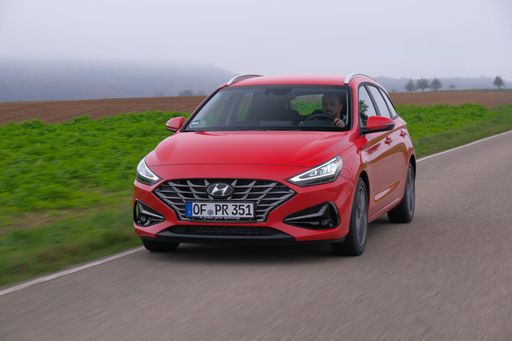 @ Hyundai Motor Company
@ Hyundai Motor Company
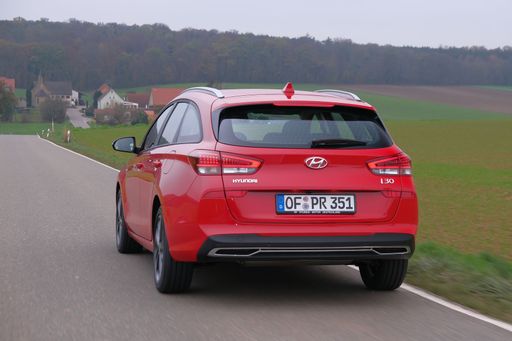 @ Hyundai Motor Company
@ Hyundai Motor Company
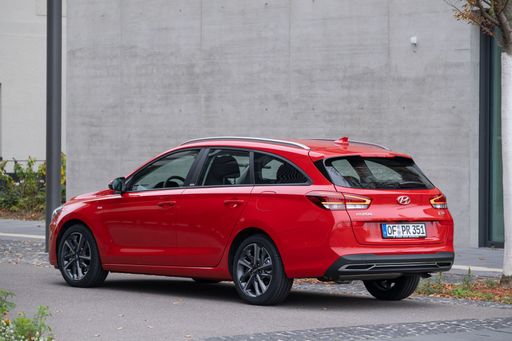 @ Hyundai Motor Company
@ Hyundai Motor Company
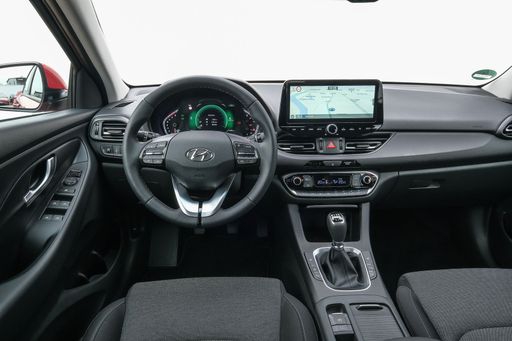 @ Hyundai Motor Company
@ Hyundai Motor Company
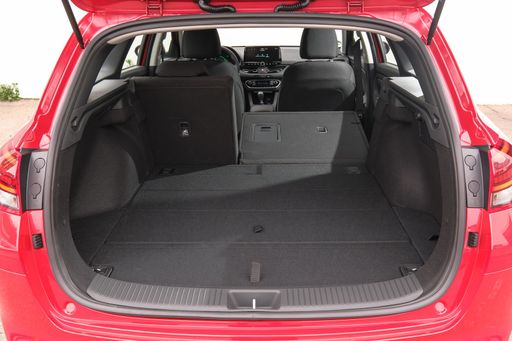 @ Hyundai Motor Company
@ Hyundai Motor Company
Nissan Qashqai
The Nissan Qashqai blends practical, family-friendly packaging with SUV styling that refuses to shout, making it a sensible and dependable choice for everyday life. It’s comfortable to live with, economical on the road, and neatly equipped enough to feel modern without ever feeling precious — perfect if you want crossover versatility without the drama.
details @ Nissan Motor Corporation
@ Nissan Motor Corporation
 @ Nissan Motor Corporation
@ Nissan Motor Corporation
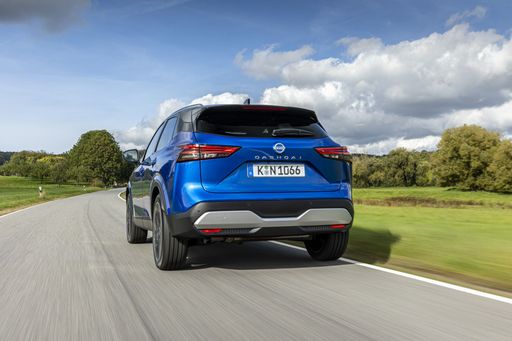 @ Nissan Motor Corporation
@ Nissan Motor Corporation
 @ Nissan Motor Corporation
@ Nissan Motor Corporation
 @ Nissan Motor Corporation
@ Nissan Motor Corporation
 @ Hyundai Motor Company
@ Hyundai Motor Company
|
 @ Nissan Motor Corporation
@ Nissan Motor Corporation
|
|
|
|
Costs and Consumption |
|
|---|---|
|
Price
24800 - 30100 £
|
Price
29600 - 39900 £
|
|
Consumption L/100km
5.7 - 6 L
|
Consumption L/100km
4.5 - 6.8 L
|
|
Consumption kWh/100km
-
|
Consumption kWh/100km
-
|
|
Electric Range
-
|
Electric Range
-
|
|
Battery Capacity
-
|
Battery Capacity
-
|
|
co2
130 - 136 g/km
|
co2
102 - 154 g/km
|
|
Fuel tank capacity
50 L
|
Fuel tank capacity
55 L
|
Dimensions and Body |
|
|---|---|
|
Body Type
Estate
|
Body Type
SUV
|
|
Seats
5
|
Seats
5
|
|
Doors
5
|
Doors
5
|
|
Curb weight
1316 - 1461 kg
|
Curb weight
1420 - 1665 kg
|
|
Trunk capacity
602 L
|
Trunk capacity
479 - 504 L
|
|
Length
4585 mm
|
Length
4425 mm
|
|
Width
1795 mm
|
Width
1835 mm
|
|
Height
1475 mm
|
Height
1625 mm
|
|
Max trunk capacity
1650 L
|
Max trunk capacity
1422 - 1447 L
|
|
Payload
439 - 524 kg
|
Payload
466 - 520 kg
|
Engine and Performance |
|
|---|---|
|
Engine Type
Petrol, Petrol MHEV
|
Engine Type
Petrol MHEV, Full Hybrid
|
|
Transmission
Manuel, Automatic
|
Transmission
Manuel, Automatic
|
|
Transmission Detail
Manual Gearbox, Dual-Clutch Automatic
|
Transmission Detail
Manual Gearbox, CVT, Reduction Gearbox
|
|
Drive Type
Front-Wheel Drive
|
Drive Type
Front-Wheel Drive, All-Wheel Drive
|
|
Power HP
100 - 140 HP
|
Power HP
140 - 205 HP
|
|
Acceleration 0-100km/h
9.8 - 13.3 s
|
Acceleration 0-100km/h
7.6 - 10.2 s
|
|
Max Speed
178 - 197 km/h
|
Max Speed
170 - 206 km/h
|
|
Torque
172 - 253 Nm
|
Torque
240 - 330 Nm
|
|
Number of Cylinders
3 - 4
|
Number of Cylinders
3 - 4
|
|
Power kW
74 - 103 kW
|
Power kW
103 - 151 kW
|
|
Engine capacity
998 - 1482 cm3
|
Engine capacity
1332 - 1498 cm3
|
General |
|
|---|---|
|
Model Year
2024
|
Model Year
2025
|
|
CO2 Efficiency Class
D, E
|
CO2 Efficiency Class
E, C
|
|
Brand
Hyundai
|
Brand
Nissan
|
What drivetrain options does the Hyundai i30 Wagon have?
Available configurations include Front-Wheel Drive.
The prices and data displayed are estimates based on German list prices and may vary by country. This information is not legally binding.
